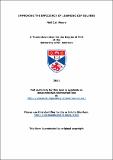Improving the efficiency of learning CSP solvers
Abstract
Backtracking CSP solvers provide a powerful framework for search and reasoning.
The aim of constraint learning is increase global reasoning power by learning
new constraints to boost reasoning and hopefully reduce search effort. In this
thesis constraint learning is developed in several ways to make it faster and
more powerful.
First, lazy explanation generation is introduced, where explanations are
generated as needed rather than continuously during propagation. This technique
is shown to be effective is reducing the number of explanations generated
substantially and consequently reducing the amount of time taken to complete a
search, over a wide selection of benchmarks.
Second, a series of experiments are undertaken investigating constraint
forgetting, where constraints are discarded to avoid time and space costs
associated with learning new constraints becoming too large. A major empirical
investigation into the overheads introduced by unbounded constraint learning in
CSP is conducted. This is the first such study in either CSP or SAT. Two
significant results are obtained. The first is that typically a small percentage of
learnt constraints do most propagation. While this is conventional wisdom, it
has not previously been the subject of empirical study. The second is that even
constraints that do no effective propagation can incur significant time
overheads. Finally, the use of forgetting techniques from the literature is
shown to significantly improve the performance of modern learning CSP solvers,
contradicting some previous research.
Finally, learning is generalised to use disjunctions of arbitrary constraints,
where before only disjunctions of assignments and disassignments have been used
in practice (g-nogood learning). The details of the implementation undertaken
show that major gains in expressivity are available, and this is confirmed by a
proof that it can save an exponential amount of search in practice compared with
g-nogood learning. Experiments demonstrate the promise of the technique.
Type
Thesis, PhD Doctor of Philosophy
Collections
Items in the St Andrews Research Repository are protected by copyright, with all rights reserved, unless otherwise indicated.

